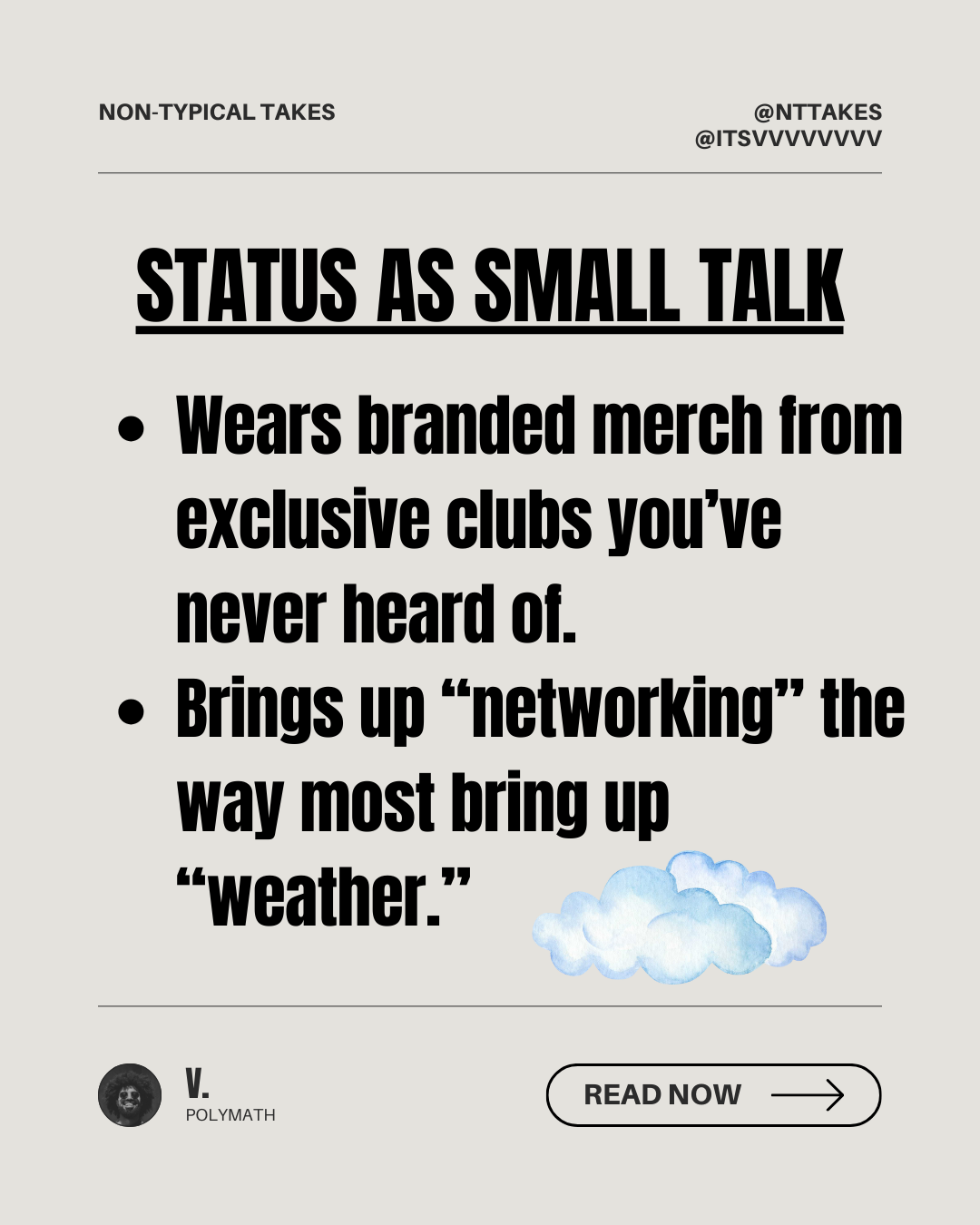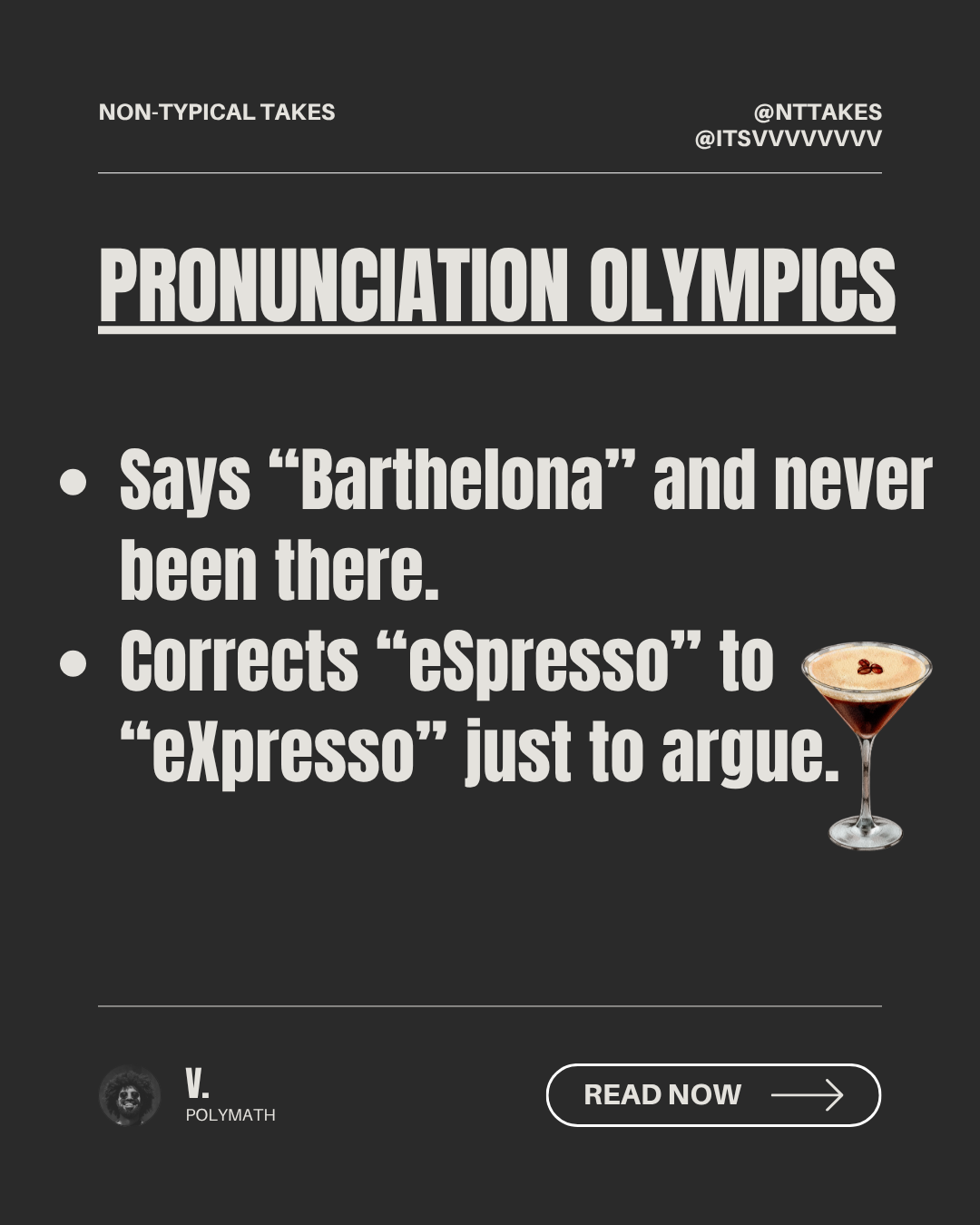[Tone: Conversational & Satirical]
You ever noticed how you don’t have to ask someone where they got their MBA? Don’t worry—they’ll tell you, usually in the middle of ordering coffee.
“Oh, this reminds me of when I was at Wharton…”
Bruh, I just asked if you wanted oat milk. I wasn’t trying to unlock your LinkedIn biography.
That’s the thing about specific types of “accomplished” people; they’re not just great at what they do, they’re committed to making sure you know they’re great at what they do. And while I love greatness, there’s a fine line between being elite and being elitist. And a whole other line when we start talking about elitism.
The bars in this article are about distinguishing between those lines before we throw all three in the same bin—because not everybody great is a gatekeeper, and not every gatekeeper is even marvelous.
The Three E’s: A Brief Field Guide
Elite: Someone who’s exceptional at their craft. Mastery. Precision. Consistency. Think Serena Williams with a racket, Kendrick Lamar in a recording booth, Simone Biles mid-air doing things gravity still hasn’t processed. Elite is skill, discipline, and artistry rolled into one. It’s rare. It’s inspiring. It’s hard-earned. You can’t Amazon Prime it, and this ain’t arriving in two days.
Elitist: The person who uses their skill, status, or access as a weapon to make others feel lesser. They’re less interested in what they can do and more invested in what you can’t. This is the muggle who corrects your pronunciation of “Nicaragua”, then sips their wine like they just prevented a global crisis. Or your coworker who “casually” mentions they got their start under a CEO you’ve only seen in documentaries.
Elitism: The system that protects and reinforces elitist behavior by making access to resources, spaces, or opportunities intentionally scarce. Elitism isn’t just an attitude; it’s infrastructure. It’s the velvet rope, the “members only” mindset, the entire economy built on keeping some people “in” and most people “out.” If elitists are the club bouncers, elitism is the actual club that plays mid music and charges $25 for water.
Well, This Is Confusing
Part of the reason elite people get dragged is because elitists have tainted the word “elite.” Social media loves to flatten the nuance: if you’re excellent at something, there must be arrogance behind it.
Plot twist… excellence isn’t the enemy. It’s how you carry it. The internet’s quick to call anyone elite a “gatekeeper,” but sometimes they’re just… brilliant at what they do and put in the work to reach that level. That brilliance makes people uncomfortable because we’ve been trained to think greatness automatically comes with a side of arrogance.
It’s like when someone sings effortlessly in karaoke. Real talk, I pull up to some studio in Hollyweird (Hollywood) for an acquaintance’s party, and karaoke is happening. I notice that there are three noticeable types of karaoke participants present. One who is going to have fun for themselves, one who wants to entertain the crowd and be silly, and the genuinely elite artist who just wants to sing a song they like or love. A few participants go by, and this at-ease-looking lady walks on stage, says “I’ve always wanted to sing this song,” and proceeds to give a legit professional song performance of “I Want to Dance With Somebody.” Ole girl was mind-blowing and the similarity to Whitney was uncanny. The entire party was singing along with her and feeling the energy, but I noticed something unusual when her performance ended and she left the stage. A decent amount of muggles were side-eyeing her, on some “okay, Whitney, calm down,” but deep down, they were probably mad because they were about to do “No Scrubs” and now you’re gonna sound like a voicemail.
The Cultural Playground
Some people treat their MBA like a barista treats latte art—you didn’t ask for it, but they’re gonna show you anyway.
“When I was at Wharton…”
Bruh, I just said hello. Why are we in a case study?
Once you know the signs, you see elitism everywhere:
In the art world, a blank canvas with a single dot can cost $3 million as long as you use enough French or dead ass Latin when describing it. (Ah, oui, the artist was channeling existential resistance to… sunscreen.)
In academia, where clarity is treated like an endangered species. The more “what the hell?” the jargon, the more critical the paper must be. Because if everyone understood it, it wouldn’t feel exclusive anymore.
In sports fandoms, you need to pass a pop quiz before you can wear the team’s jersey. (Name the player who stood up and yelled “YES!” when Jordan hit the 16-foot mid-range jumper in 1995 against the Spurs, or get out of my section.)
The problem isn’t skill or passion—it’s using those things as a fence instead of a bridge.
Why Elite Can Be Good for Us
Being elite is beautiful when it’s rooted in mastery and grace (maybe even humility, but I have some qualms with the word and its usage). It raises the bar for what’s possible. It pushes culture forward. It creates new possibilities for the people coming after you.
If you’ve reached the top of your field, your work should be a lighthouse, not a locked door. Greatness should welcome people in—like a block party where the DJ is so good, even the aunties are dancing, and not just doing the electric slide.
What’s not beautiful? Being so elite, you turn into that one basketball player who only shows up for the charity game just to dunk on 8-year-olds.
The Personality Problem
They say you should mention your credentials subtly. MBA folks heard that and said, “Bet.”
“We should grab lunch sometime. When I was at Wharton—extra guac, please.”
Being elitist is socially acceptable insecurity. It’s peacocking dressed up in prestige. It’s not about the craft, the skill, or the knowledge—it’s about the status hit they get from reminding you they have it.
Elitism as a belief system exists to protect that hit. It reinforces the idea that some people inherently deserve more access, more opportunities, more humanity… just because they’re “special.” And that’s not excellence. That’s ego in a tailored suit.
Greatness Without Gatekeeping
Being elite should inspire people, and being elitist should annoy them. And elitism? That’s just insecurity with a concierge service.
I’m all for high standards, excellence, and mastery. But the moment your greatness requires someone else’s smallness to feel valid, it’s not greatness anymore—it’s performance art.
So let’s retire the bad habit of assuming everyone who’s excellent is automatically elitist. Let’s also retire the people who mistake their degree, title, or club membership for a personality.
Oh, and if you ever meet someone who says, “When I was at Wharton…” unprompted? Just smile, nod, and ask if that’s near Trader Joe’s.
Live long and prosper.
SWIRV. 🖖🏽









Funny article V! Also very specific. Who is this Wharton business school name dropper in your life?
Elitists suck! Thanks for the article. You continue to impress me with your amazing writing skills and friendly tone.